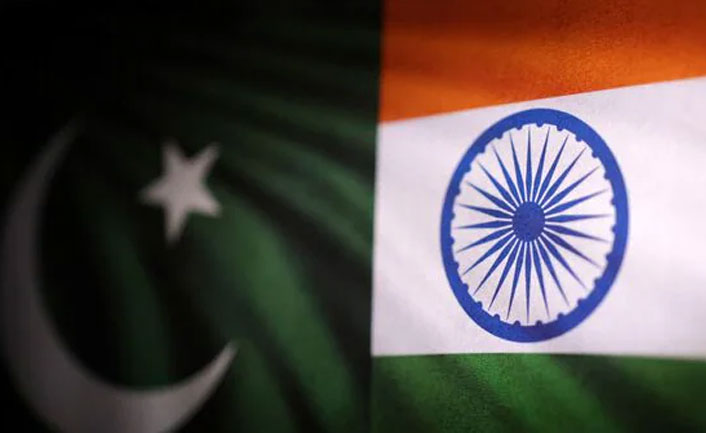Pakistan authorizes military response after India strikes
May 7, 2025 02:55 pm
India has said it carried out strikes in Pakistan and Pakistani-administered Kashmir. Pakistan has vowed retribution over what it describes as an “act of war.”
The Pakistan prime minister’s office says the armed forces of Pakistan have been authorized to undertake corresponding actions after India’s strikes.
At the same time, the Pakistan government security committee says India has “ignited an inferno in the region,” and that responsibility for the ensuing consequences lies squarely with New Delhi.
The committee said the world must hold India “accountable.”
Why has the Kashmir dispute been reignited?
In August 2019, India revoked Article 370 of its constitution, stripping Jammu and Kashmir of its semi-autonomous status to be ruled directly from New Delhi.
The move triggered a major escalation in tensions with Pakistan, which strongly opposed the decision and downgraded diplomatic ties. India deployed tens of thousands of additional troops, imposed curfews, shut down internet services, and detained local political leaders. The region was placed under a heavy security lockdown for months, drawing criticism from international human rights organizations.
Indian security forces carried out intensified counterinsurgency operations, resulting in the deaths of numerous suspected militants. However, these operations often led to civilian casualties.
India accused Pakistan of continuing to support militant infiltration across the Line of Control, which Pakistan denies.
A 2021 ceasefire brought temporary calm, but skirmishes and unrest resumed. China’s border tensions and economic ties with Pakistan have added complexity to the dispute.
The region remained volatile, with delayed elections, restricted freedoms, and ongoing sporadic violence, even before the April 22 Pahalgam Attack sparked the latest crisis.
Why is Kashmir contested?
When former British Indiagained independence and was divided into India and Pakistan in 1947, Muslim-majority Kashmir was free to choose which new country to join, or to remain independent.
The Maharaja of Jammu and Kashmir, a Hindu ruler of a Muslim-majority state, initially wanted independence but ultimately chose to accede to India after a Pakistani-backed tribal invasion.
A war erupted and India asked the United Nations to intervene. The UN recommended that they hold a referendum on whether the state would join India or Pakistan. However, neither country could agree on a deal to demilitarize the region ahead of such a vote.
In July 1949, as recommended by the UN, India and Pakistan agreed on a ceasefire line which eventually became the so-called Line of Control (LoC) following an agreement signed in 1972.
The region became divided into India-administered Jammu and Kashmir and Pakistan-administered Azad Kashmir plus Gilgit-Baltistan. Adding to the complexity, China also controls a portion (Aksai Chin).
Both India and Pakistan still claim full sovereignty over the region.
There have been sporadic conflicts between the two sides over the contested region since then, interspersed with periods of de-escalation.
But the election of the Hindu-nationalist BJP to power in India in 2014 marked a new period of tension. The BJP government responded to a major attack in 2019 by launching cross-border air strikes. Later that year, it revoked Jammu and Kashmir’s autonomy, sparking increased protest within the region that was met with repression.
This was followed by a period of relative calm in which Delhi promoted a nascent tourist sector in the region that began to boom until the attack against tourists near the hotspot of Pahalgam on April 22, 2025.
Airlines re-route, cancel flights amid escalating tensions
Airspace over northwestern India and all of Pakistan was nearly empty, with only a handful of civilian flights visible on Wednesday due to escalating military tensions between India and Pakistan.
Airlines across Asia rerouted or canceled dozens of flights amid the developing situation.
India on Wednesday targeted at least nine sites on Pakistani territory where it said “terrorist attacks against India have been planned.”
Flight-tracking data from Flightradar24 showed more than 50 flights to or from Pakistan were canceled, and over two dozen international flights were diverted to avoid Pakistani airspace.
According to the Pakistan army, there were 57 international flights operating in Pakistan airspace at the time of India’s military operation.
Domestic flights in both countries were also disrupted, with India temporarily closing several airports, impacting operations by Air India, IndiGo, SpiceJet, and Akasa Air.
Among the Asian airlines that diverted or cancelled their flights were Taiwan’s EVA Air and China Airlines, Korean Air, Thai Airways, Vietnam Airlines and Malaysia Airlines.
Global carriers including Air France, British Airways, Swiss International Air Lines, Emirates, and Lufthansa had already begun rerouting to avoid Pakistani airspace and were taking longer routes amid rising tensions between the two neighbors, according to flight-tracking data from Flightradar24.
The Association of Asia Pacific Airlines raised concerns over both operational impacts and safety, pointing to risks of manipulation of Global Positioning System (GPS) in conflict zones that can send commercial aircraft off course.
Pakistan says 26 civilians killed in Indian military action
A spokesperson for the Pakistani army said 26 civilians were killed and another 46 were injured in India’s attack on Wednesday.
India’s military said it struck infrastructure used by militants in Pakistan and Pakistan-administered Kashmir.
India said the operation on Wednesday between 1.05 and 1.30 a.m. (1935 to 2000 GMT) targeted at least nine sites “where terrorist attacks against India have been planned” and were meant to “deliver justice to the victims of the Pahalgam terror attacks.”
India called the strikes “non-escalatory, proportionate and responsible.”
Three Indian fighter jets crash in Indian-administered Kashmir
Three Indian fighter jets crashed on Wednesday shortly after India announced it was striking “terrorist infrastructure” across the border in Pakistan, media reports said citing government sources.
The wreckages were found in Akhnoor, Ramban and Pampore regions of Jammu and Kashmir, according to a DW correspondent.
The cause of the crashes and the fate of the pilots remain unclear.
A Pakistani military spokesperson said five Indian aircraft were shot down. India has not verified this claim.
Source: DW News
--Agencies












